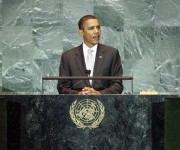“So where do we go from here?” asks Geoffrey Lean. “How do we get from the … debacle of Copenhagen to a new and worthwhile climate treaty?”
The question reminds me of the old Bert & I tale about the Maine farmer who, when asked by a motorist for directions to Millinocket, answers, “You cahn’t get theyah from heea.”
Lean observes that “Rarely have such high hopes [for Copenhagen] been dashed so swiftly,” and says “the summit was only saved from total disaster by unprecedented negotiations between the leaders themselves.”
I’m more inclined to see the unprecedented, last-minute, let’s-save-ourselves-from-complete-embarrassment negotiations as adding final insult to grievous injury, but be that as it may, what’s most interesting in Lean’s analysis are the “7 Steps” he outlines to get from debacle to a worthwhile treaty, which may be summed up:
1. Smooth ruffled feathers in the 187 nations cut out of the last-minute, 5 nation deal cutting.
2. Persuade countries to pledge significant greenhouse emissions reductions, particularly the Europeans.
3. Pass U.S. cap & trade bill.
4. Revamp UN treaty negotiations process.
5. Ensure that monies pledged in Copenhagen become monies spent.
6. Figure out what we’re trying to do (extend Kyoto?, do something else?, extend Kyoto without the US?).
7. Convince China of what we know, but they apparently don’t know, which is that signing a climate treaty is in their best interest.
Come now.
This is a list of things we’ve been trying for at least a decade (2, 3, 6 & 7), plus some stuff we apparently need to do now because what we’ve been trying to do for the last decade didn’t work (1, 4), and one thing to follow up on (5). Nowhere does Lean give even a flicker of an idea of how these things might be approached differently and nowhere does Lean consider the possibility that the debacle in Copenhagen might be the direct result of pursuing the wrong climate strategy.
I think we tried an extraordinary, radical approach to political change — in essence, to sneak something into place, bypassing the tough business of challenging how things are — which has inarguablly failed and it’s past time we return to more traditional means of winning tough stuff. In that spirit, here are 7 Steps + 3 I think will be far more productive.
1. Ramp up the conflict between those nations that have recognized climate realities and are willing to take on the US, China, India, etc. (along with nations that think they can make a buck, and most likely deserve to).
2. Drop the misplaced attention to emissions and focus on shutting down extractions. There are only a handful of oil, coal, and gas fields in the world, controlled by a few countries — like, whaddya know? the 5 that cut the deal in Copenhagen. Shutting down mines and wells is the only practical, last-minute measure humanity can take, so we’d best start a drumbeat for it now.
3. Defeat any half-measure, in the US or elsewhere, intended to protect fossil fuel burning, particularly coal, and/or that tries to put off what must be decided immediately to some hypothetical future where political conditions are better, or someone else is responsible.
4. Use the UN to focus pressure on the top 5-10 nations, but aim for a desperate, multi-lateral agreement between the US, China, Australia, and maybe India to phase out coal extractions (covering over 80% of supply), coupled with the massive ramp-up in efficiency and renewables to replace it; the lion’s share paid for by the US.
5. Denounce the Copenhagen pledges as the pittance they are (though they should still be paid), and demand spending on a scale concomitant with saving our collective bacon.
6. Figure out what we’re trying to do (see 4).
7. Convince China that it is in their interest to sign a climate deal by making it in their interest (see 4). and,
8. Focus on multi-nationals as well as nations. In all the swirl of action between and about nations, we seem to have forgotten that it’s Exxon-Mobil, BP, Peabody Coal, Gazprom, Shell, and the like that are making more money than the world has ever seen by selling out our future.
9. Stop dissembling about how bad it is and stop pretending to ourselves that we’re not being disingenuous. Whenever we put this civilization-busting threat in terms of an opportunity (for energy independence, green jobs, or whatever), rather than what it is (a last bid to save our asses), we completely undercut the only point that matters.
10. Increase — and dramatically increase — turmoil, dissent, civil disobedience, and conflict. We are never, and were never going to quietly negotiate an orderly transfer away from oil, gas, and coal. It will take an immense, global upheaval, which we must both foment and ensure remains non-violent.



